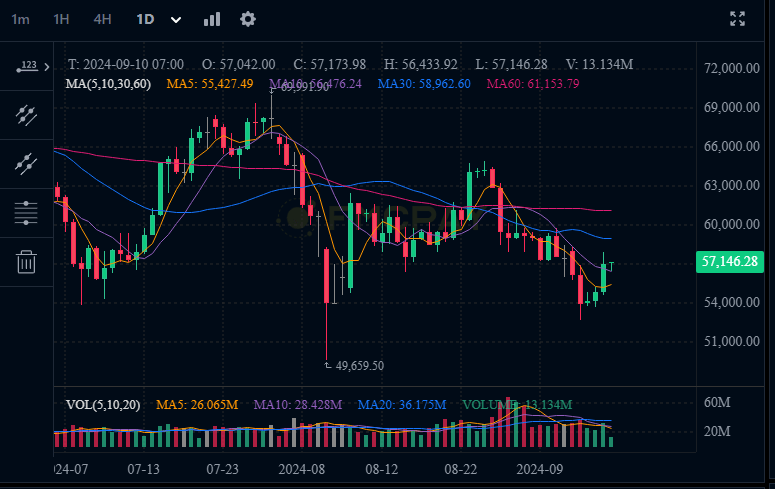Expert trader Peter Brandt has predicted that the price of Bitcoin may drop below $40,000. His use of Bayesian Probability Theory to market analysis is well-known.
As new information becomes available, Brandt’s process entails updating the likelihood of events. A fundamental component of Bayesian Probability Theory, this strategy aids investors in modifying their forecasts in response to new information.
Peter Brandt: There are 65% chances of Bitcoin dropping below $40,000
When Brandt started trading Bitcoin in 2016, he thought there was a 50% chance the price would hit $100,000. He also believed that it may fail and become the contemporary equivalent of a “Pet Rock.”
But as time went on, proprietary technical analysis tools had a big impact on how Brandt saw things.
For example, in the beginning of June, Brandt predicted a 50% likelihood of a decline to $30,000 and a 50% chance of an increase to $140,000. But as of right now, his predictions are now as follows:
- 65% chance of Bitcoin falling under $40,000
- 20% chance of Bitcoin peaking at $80,000
- 15% chance of Bitcoin hitting $130,000 by September 2025
Gautam Chhugani, a Bernstein analyst, contributed to the conversation by pointing out the potential influence of the next US presidential election on Bitcoin pricing. Chhugani claims that the result—whether Kamala Harris or Donald Trump prevails—could have a significant impact on the future of cryptocurrencies.
“We expect the delta between the two political outcomes to be wide. We expect Bitcoin to claim back new highs, in case of a Trump win and by Q4, we expect Bitcoin to reach close to $80,000-$90,000 range. However, if Harris wins, we expect Bitcoin to break the current floor around $50,000 and test the $30,000-$40,000 range,” Chhugani stated.
Since its March peak, the price of Bitcoin has ranged between $55,000 and $70,000 this year. It has increased by 3% in the last day to trade at about $56,500 as of this writing.

The outcome of the US election on November 5 appears to have an impact on the Bitcoin. In addition, the larger political environment is also very important, especially the stances taken by US lawmakers about cryptocurrencies.
Given that Trump has positioned himself as a pro-crypto candidate, Standard Chartered has projected that Bitcoin will soar to $150,000 in the event that he is re-elected. Conversely, Democratic policies are thought to be less supportive of cryptocurrencies, particularly those that have been shaped by individuals like Massachusetts Senator Elizabeth Warren and US Securities and Exchange Commission (SEC) Chair Gary Gensler.
Chhugani therefore highlighted the wider ramifications of a supportive regulatory framework for cryptocurrencies.
“A crypto-friendly election outcome and positive regulatory environment is not priced in. A positive regulatory environment would take away the policy risk for financial institutions and banks to participate, thus removing the handicap for digital assets to compete with traditional assets for institutional flows,” Chhugani said.
Spot Bitcoin ETFs end 8-day outflows streak, Ether ETFs lose $5.2M
After eight days of withdrawals totaling over $1.18 billion from their total assets under management, spot Bitcoin exchange-traded funds in the US experienced inflows for the first time, suggesting a possible reversal in investor opinion.
SoSoValue data shows that on September 9, net inflows of $28.6 million were recorded by the 12 spot Bitcoin exchange-traded funds, breaking the previous eight-day outflow trend.
With reported inflows of $28.6 million, Fidelity’s FBTC topped the way, increasing its total inflows since launch to $9.45 billion. This comes after seven trading days in which the fund had negative flows.
The next two assets with inflows of $22 million and $6.8 million, respectively, were Bitwise’s BITB and ARK 21Shares’ ARKB. After three days with no trading, Invesco’s BTCO saw relatively moderate inflows of $3.1 million.
Grayscale’s GBTC saw withdrawals of $22.8 million, offsetting these inflows and pushing its total outflows since debut to almost $20 billion. It’s interesting to note that $9.1 million was pulled out of BlackRock’s IBIT, the biggest spot Bitcoin ETF by net assets, throughout the day. The six Bitcoin ETFs that were left were all neutral.
On September 9, the combined trading volume of the twelve Bitcoin ETFs fell to $1.61 billion, a sharp decrease from the $2.39 billion recorded the day before. Since their establishment, these funds have seen a total net inflow of $16.92 billion. As of this writing, Bitcoin (BTC) was trading at $57,162, up 4.2% from the previous day.
On September 9, after four days of net negative flows, the nine-spot Ethereum ETFs had net outflows of $5.2 million.
With $22.6 million leaving the fund, Grayscale’s ETHE led the withdrawals once more, bringing the total amount of funds removed from the fund to $2.69 billion since its inception on July 23. In contrast, just three offerings—Fidelity’s FETH, Grayscale’s ETH, and Biwise’s ETHW—saw inflows of $7.6 million, $8 million, and $1.8 million, respectively. No money moved in any of the five ETH ETFs that were left for the day.
Additionally, on September 9, the daily trading volume of these investment vehicles dropped significantly to $124.51 million from the previous day. To date, there has been a total net outflow of $573.49 million from the spot Ether ETFs. Ethereum (ETH) was up 2.6% at the time of publishing, trading at $2,345.
John Deaton slams Senator Warren of lobbying for banks, defends Bitcoin billionaires
John Deaton criticized Senator Warren of Massachusetts for her anti-crypto position, pointing out that fewer than 1% of illegal activities include bitcoin.
The Republican candidate from Massachusetts, John Deaton, has launched new criticisms against Senator Elizabeth Warren for her advocacy of the banking sector rather than the cryptocurrency business. According to information provided by Deaton, money laundering involving hundreds of millions of dollars has been made possible by the largest banks, whereas cryptocurrency is utilized for fewer illegal operations.
John Deaton says less than 1% Bitcoin used in illicit transactions
John Deaton, an attorney representing XRP, recently criticized Massachusetts Senator Elizabeth Warren for her views on cryptocurrencies and her repeated criticisms of its usage for illegal activities in an interview with WBUR. Following his victory in the Republican Primary last week, he made some recent remarks.
Citing data from the UN Office on Drugs and Crime, Deaton stressed that fewer than 1% of Bitcoin and cryptocurrency transactions are utilized for criminal reasons. However, he demonstrated that about $800 billion to $2 trillion in money laundering occurs annually through banks, identifying conventional institutions such as HSBC, JPMorgan, Bank of America, and Wells Fargo as the main culprits rather than cryptocurrency companies.
Deaton went on to accuse Senator Warren of being a leading proponent of large banks, pointing out that she had criticized “crypto billionaires.”
Warren was also reminded by the XRP attorney that he had taken further steps to obtain regulatory clarification around financial assets. Deaton continued, saying that he had filed a lawsuit against the SEC, revealing conflicts of interest and defending 75,000 individual token holders without being prosecuted.
He also emphasized that, in comparison to Warren’s efforts as a member of the Senate Banking Committee, his monitoring work as a private person has been more thorough.
In addition to John Deaton, prominent figures in the cryptocurrency sector that back Kamala Harris include Anthony Scaramucci and Mark Cuban, who attacked Elizabeth Warren for being a hypocrite. Scaramucci also referred to Gary Gensler and Senator Warren as the “access of regulatory evil.”
Guess who terrifies @SenWarren the most?
It’s the MANY Kamala Harris supporters out there–like @Scaramucci & @mcuban–who support @DeatonforSenate.
Listen to the Mooch absolutely demolish Warren in 42 seconds flat.👇
(via @scottmelker) pic.twitter.com/CbcYB2aO8J
— MetaLawMan (@MetaLawMan) September 9, 2024
Crypto legistation soon after Trump victory?
Crypto legislation has been neglected under the Biden administration, and Kamala Harris, the next Democratic Party contender, doesn’t appear to care about it either. Kamala Harris has not mentioned digital assets or cryptocurrency in any of her recent policy choices.
However, if re-elected to the White House, Donald Trump has pledged to implement a number of crypto-friendly legislation. Therefore, Trump might advance cryptocurrency legislation more quickly and provide regulatory clarity to the business by collaborating with lawmakers like John Deaton who are more knowledgeable about the legal frameworks governing the sector.
Over the past three years, the US SEC has scared off companies in the cryptocurrency space, and analysts say additional crackdowns on the sector are coming in September.


